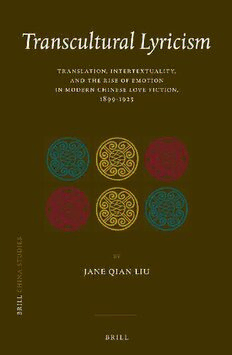
Transcultural Lyricism : Translation, Intertextuality, and the Rise of Emotion in Modern Chinese Love Fiction, 1899-1925 PDF
Preview Transcultural Lyricism : Translation, Intertextuality, and the Rise of Emotion in Modern Chinese Love Fiction, 1899-1925
Transcultural Lyricism China Studies Published for the Institute for Chinese Studies, University of Oxford Edited by Micah Muscolino (University of Oxford) VOLUME 36 The titles published in this series are listed at brill.com/chs Transcultural Lyricism Translation, Intertextuality, and the Rise of Emotion in Modern Chinese Love Fiction, 1899–1925 By Jane Qian Liu LEIDEN | BOSTON Library of Congress Cataloging-in-Publication Data Names: Liu, Qian, 1985– author. Title: Transcultural lyricism : translation, intertextuality, and the rise of emotion in modern Chinese love fiction, 1899–1925 / by Jane Qian Liu. Description: Leiden ; Boston : Brill, [2017] | Series: China studies, ISSN 1570-1344; 36 | Includes bibliographical references and index. Identifiers: LCCN 2016045151 (print) | LCCN 2016056864 (ebook) | ISBN 9789004301313 (hardback : alk. paper) | ISBN 9789004301320 (e-book) | ISBN 9789004301320 (E-book) Subjects: LCSH: Chinese fiction—20th century—History and criticism. | Chinese fiction—Western influences. | Translating and interpreting. | Intertextuality. Classification: LCC PL2442 .L5655 2017 (print) | LCC PL2442 (ebook) | DDC 895.13/4809—dc23 LC record available at https://lccn.loc.gov/2016045151 Typeface for the Latin, Greek, and Cyrillic scripts: “Brill”. See and download: brill.com/brill-typeface. issn 1570-1344 isbn 978-90-04-30131-3 (hardback) isbn 978-90-04-30132-0 (e-book) Copyright 2017 by Koninklijke Brill nv, Leiden, The Netherlands. Koninklijke Brill nv incorporates the imprints Brill, Brill Hes & De Graaf, Brill Nijhoff, Brill Rodopi and Hotei Publishing. All rights reserved. No part of this publication may be reproduced, translated, stored in a retrieval system, or transmitted in any form or by any means, electronic, mechanical, photocopying, recording or otherwise, without prior written permission from the publisher. Authorization to photocopy items for internal or personal use is granted by Koninklijke Brill nv provided that the appropriate fees are paid directly to The Copyright Clearance Center, 222 Rosewood Drive, Suite 910, Danvers, ma 01923, usa. Fees are subject to change. This book is printed on acid-free paper and produced in a sustainable manner. For my mother He Wenfang and my father Liu Jin ∵ Contents Acknowledgements ix Introduction: Translation and Intertextuality of Foreign Literatures in Early Twentieth-Century Chinese Love Fiction 1 1 Pseudowriting and Creating Channels for the Expression of Emotion 46 2 Creating Melodramatic Emotional Effects: Zhou Shoujuan’s Creative Translations of Short Stories on Love 78 3 Transcultural Lyricism in Su Manshu’s Fictional Writing 118 4 Finding the Right Medium for Emotional Expression: Intertextualizing Western Literary Texts in Yu Dafu’s Early Short Stories 165 Conclusion: Writing about Emotion with Another’s Pen 201 Bibliography 209 Index 231 Acknowledgements At the moment of completion of this book, I would like to thank first of all Dr. Margaret Hillenbrand, my doctoral supervisor, for helping me see the value of my research, for providing me with many insightful suggestions, and for her kindness in supporting me in my academic pursuits throughout my Oxford years and afterwards. I owe my gratitude to Prof. Liu Hongtao of Beijing Normal University, my graduate school supervisor, who has always guided me and helped me at those crucial moments of life choices. I want to thank Prof. Jonathan Stalling, mentor and friend, for talking me into the academic path more than six years ago. Without his encouragements, I would not have had the chance to experience Oxford, a fascinating place that has both bettered and humbled me. Many people have helped me with this book in various ways. Prof. Glen Dudbridge provided me with insightful suggestions regarding passages of trans- lation in this book. Prof. Michel Hockx and Prof. Henrietta Harrison offered me many useful suggestions both during my DPhil viva and subsequently. Prof. Ronald Schleifer helped me with theoretical issues relating to intertextuality. I have benefited greatly from his insights and erudition. I also learned a great deal from the faculty of the Institute for Chinese Studies at Oxford, including Dr. Peter Ditmanson, Dr. Liu Tao Tao, Dr. Laura Newby, Dr. Dirk Meyer, and Dr. Justin Winslett. I owe a great debt of thanks to Elisabeth Forster, who was made to read each chapter of mine, sometimes more than once. I want to thank Marshall Craig for cheering me up during the toughest stages, Lincoln Tsui and Guo Ting for always being so resourceful and willing to help, and Sam Yin and Chen Yunju for sharing with me many pains and gains of doctoral study. I want to thank Arnaud Debauge for his willingness to discuss my work and for being a great language partner and friend. I also want to thank Kate Costello, Yegor Grebnev, Sara Wilson, and Larson Di Fiori for their help during various stages of writing up this book. I want to thank the librarians at the Chinese Studies Library at Oxford, par- ticularly Joshua Seufert and Hannie Riley. Their kindness and good humour made the library such a pleasant place to stay. I also want to thank Qin Higley, my editor at Brill, for her help and patience throughout these last two years, when we together saw the finalization of this book. Although I left Oxford over two years ago, it is still and will always be to me “the city of dreaming spires,” as I tell my own students in my lectures on British literature at Beijing Normal University. In those precious years, I was so
